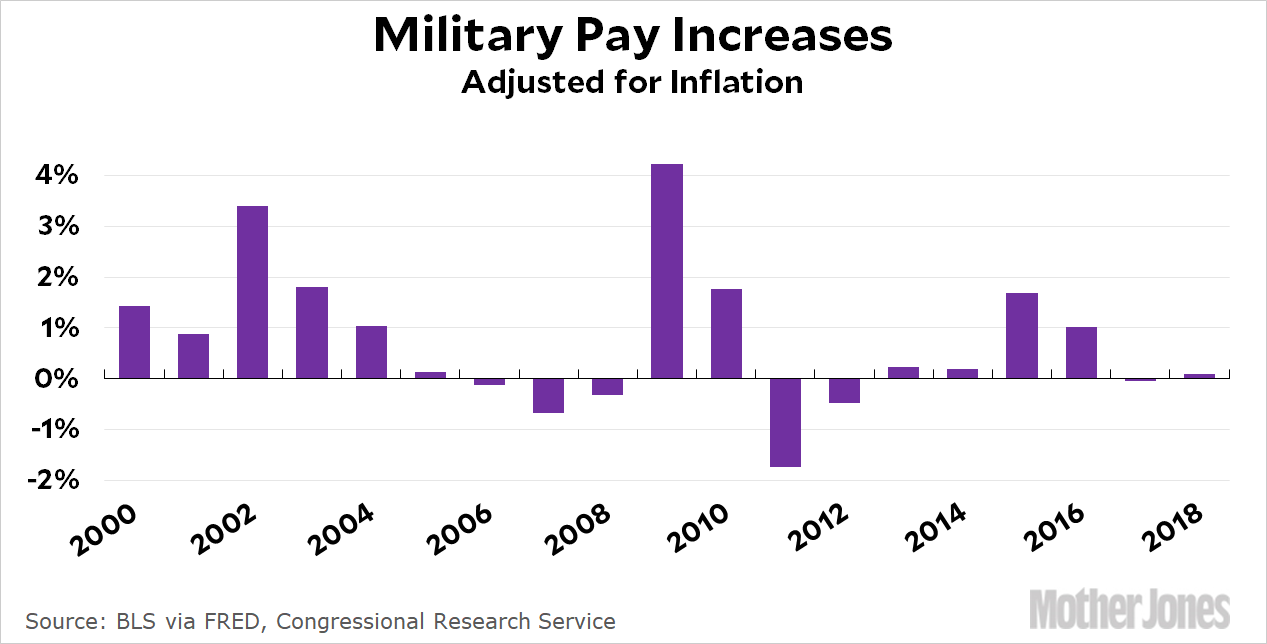Military Pay Increase - A chart showing every military pay raise in the past 30 years could soon be matched by Congress with the lowest military pay increase in recent memory.
Civilian federal workers appear poised for a 1 percent pay raise in 2015. President Obama called for it, and Congress has shown no inclination to block it.
Military Pay Increase

The fate of the military's growth, however, very much hangs in the balance. Obama and a Senate committee supported a 1 percent pay raise, while the House passed legislation giving uniformed service members a 1.8 percent base pay raise.
Pentagon $858 Billion Spending Bill Includes Pay Raises, Ukraine Aid
The Senate has yet to pass its annual defense authorization bill, which sets restrictions on military pay increases. If the Senate advances the committee-backed version of the bill, House-Senate negotiators will have to reconcile the difference between the 1.8 percent increase and the 1 percentage point increase in conference committee.
Military personnel received a 1 percent raise in 2014, the lowest increase in decades. Annual pay increases peaked in 1982, when uniformed service members received a 14.3 percent raise after receiving an 11.7 percent raise the previous year.
Military pay increases are technically automatically tied to the Bureau of Labor Statistics - Employment Cost Index - which measures wage growth in the private sector. However, the president will usually propose himself, and Congress has the final say. Defense Secretary Chuck Hagel has backed a plan to give service members smaller pay raises as part of a larger effort to reduce compensation costs, saying the Pentagon can't afford the big raises it received in the years after the Sept. 11, 2001, terrorist attacks. .
According to the Congressional Research Service, civilian and military pay increases sometimes mirrored each other, especially in the 1980s and 1990s. Since the turn of the century, Congress has provided military personnel with large pay bumps. The chart below shows salary increases for military and federal civilian employees over the past 30 years:
This Year's Pay Increase For The Military Was The Fourth Lowest Of The Decade
This website uses cookies to improve user experience and analyze performance and traffic on our website. We also share information about your use of our site with our social media, advertising and analytics partners. Learn more / Don't sell my personal information
When you visit our website, we store cookies to collect information on your browser. The information collected may relate to you, your preferences or your device and is often used to make the site work as you expect and provide a more personalized web experience. However, you can choose not to allow certain types of cookies, which may affect your experience of the site and the services we can offer. Click on the different category headings to learn more and change our default settings according to your preferences. You cannot opt out of our first-party cookies which are strictly necessary as they are used to keep our website working properly (such as prompting cookie banners and remembering your settings, logging into your account, redirecting you when you log in . outside , and others.). Please follow this link for more information about the first and third party cookies used.
We do not allow you to opt out of some of our cookies, as they are necessary to keep our website working properly (such as prompting our cookie banner and remembering your privacy preferences) and/or to monitor site performance. These cookies are not used in a way that constitutes a "sale" of your data under the CCPA. You can set your browser to block or notify you of these cookies, but if you do so some parts of the site will not work as intended. You can usually find these settings in your browser's Options or Preferences menu. Visit www.allaboutcookies.org to learn more.

Under the California Consumer Privacy Act, you have the right to opt out of the sale of your personal information to third parties. These cookies collect information for analysis and to personalize your experience with targeted ads. You can exercise your right to opt out of the sale of personal information by using this toggle switch. If you opt out, we will not be able to offer you personalized ads and will not transfer your personal information to any third party. Additionally, you can contact our Legal Department for further clarification on your rights as a California consumer using this My Rights Training link.
Military Pay Increase: Too Little, Too Late?
If you have enabled privacy controls in your browser (such as plugins), we must consider this a valid request to opt out. Therefore we will not be able to track your activities over the web. This may affect our ability to personalize ads according to your preferences.
Our advertising partners may set targeting cookies through our site. Those companies may use it to build a profile of your interests and display relevant ads to you on other sites. They do not store personal information directly, but based on the unique identification of your internet browser and device. If you do not allow these cookies, you will experience less targeted advertising.
Social media cookies are set by the various social media services we've added to the site so you can share our content with your friends and network. They can track your browsing on other sites and build a profile of your interests. This may affect the content and messages you see on other websites you visit. If you do not allow these cookies, you may not be able to use or view these sharing tools.
If you would like to opt out of all of our reports and lead lists, please submit a privacy request on our Do Not Sell page.
Bad Idea: Paying Servicemembers More To Do The Same Amount Of Work
A cookie is a small piece of data (text file) that a website - when a user visits - asks your browser to store on your device to remember information about you, such as your language preferences or login information. Those cookies are set by us and are called first-party cookies. We also use third-party cookies – ie cookies from a different domain than the domain of the website you are visiting – for our advertising and marketing efforts. More specifically, we use cookies and other tracking technologies for the following purposes:
We also use cookies to personalize your experience on our website, by determining the most relevant content and ads to show you, and to monitor site traffic and performance, so we can improve our website and your experience. You can opt out of the use of such cookies (and the associated "sale" of your personal information) by using this toggle switch. You will still see some ads, regardless of your choices. Because we do not track you across devices, browsers and GEMG properties, your choices will only be effective on this browser, this device and this website.
Please read our privacy policy as it has been updated recently. Government Executive uses cookies for analysis and personalization. By continuing to use this site, you agree to our use of cookies. Both the Biden administration's FY 2023 budget and the Democratic-controlled Congress' National Defense Authorization Act (which sets the basis for the defense budget) recommend a 4.6% pay raise for the military. workers in 2023 (compared to 2.7% in 2022).

It has now been confirmed with the passage of Omnibus Bill 2023. The updated salary chart (see below) and the 11% accommodation allowance adjustment are detailed below.
Obama Orders 1.6 Percent Military Pay Raise For 2017
While the 4.6% base pay increase is the largest increase in nearly 20 years, it is still below current inflation and the 2023 COLA. Government employees in the GS pay scale will also get the same pay increase in 2023.
Below is the 2023 military salary chart based on a 4.6% increase. This pay scale covers active duty members (officers and officers) of the Navy, Marine Corps, Army, Air Force, Space Force and Coast Guard.
The basic pay scale for the current and most recent year is shown in this article and is provided by pay grade (levels O, W and E) and years of service (above and below 20).
Military compensation, which includes base pay and allowances, is reviewed annually and adjusted for inflation by an act of Congress (through the National Defense Authorization Act), with presidential recommendations factoring into the final determination.
Military Pay Raise 2022
The basic salary chart does not include allowances such as Basic Housing Allowance (BAH) and Basic Subsistence Allowance (BAS) – both of which will be increased by 11% in 2023. This record increase is set to offset the high cost of food prices. and rental houses.
I will update the pay charts as necessary once the final pay charts are released by the Defense Financial and Accounts Service.
The higher pay levels will be reflected in the pay of members of the armed services after January 1, 2023 (January 13 pay).

Congress has now passed the National Defense Authorization Act for Fiscal Year 2022 (FY22 NDAA), authorizing a 2.7 percent pay raise for active duty members of the Armed Forces.
Bigger Military Pay Raise On Lawmakers' Agenda For 2022
You can see the monthly base salary chart at the end of 2022 (Source: DoD)
Military drone range, laser range finder military, military range bags, military range targets, long range military radio, military radio range, military range finder, military long range binoculars, range rover military discount, military range rover, range of military drones, military range bag
0 Comments